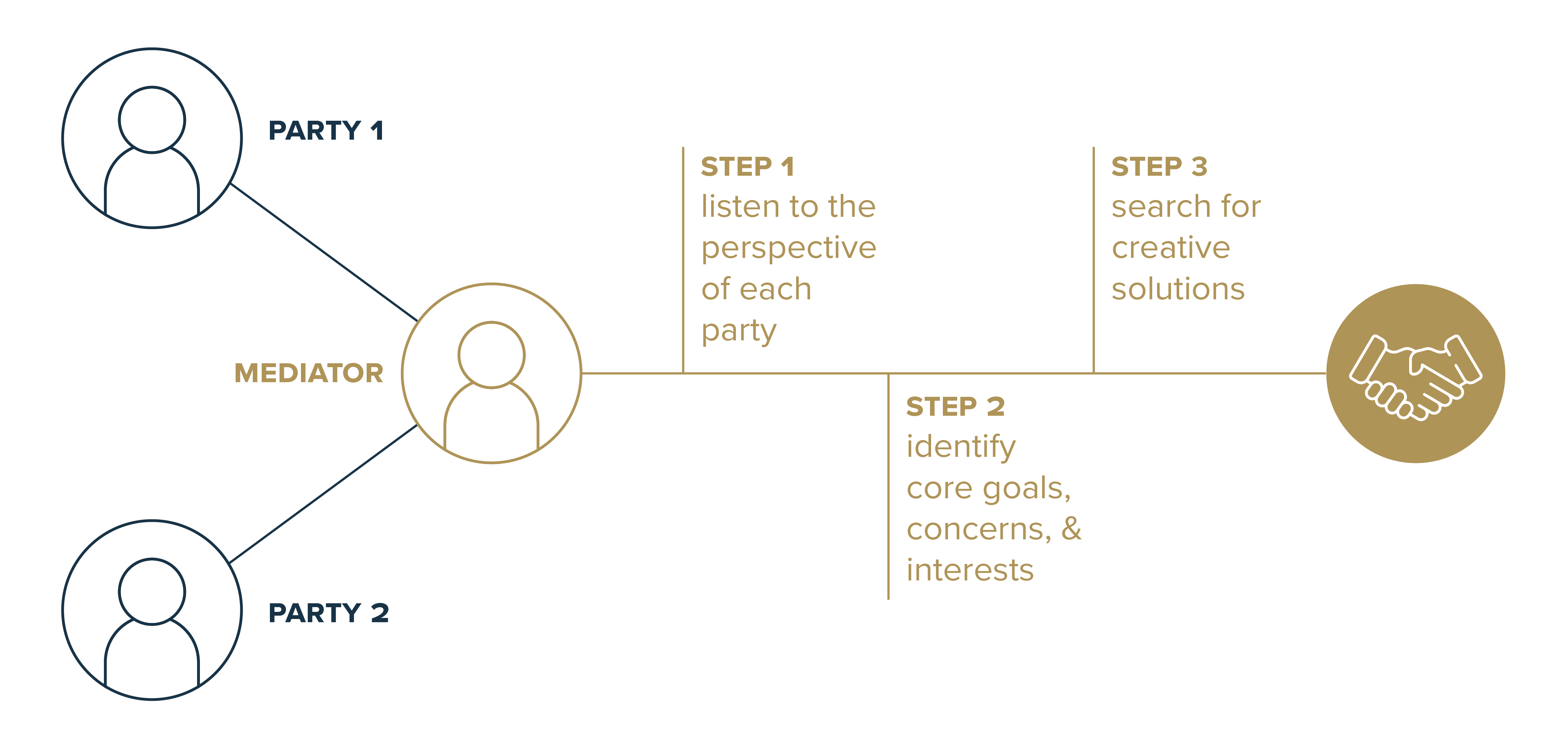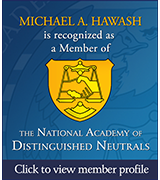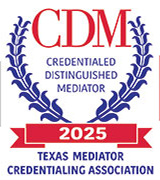Michael A. Hawash, Esq.
Schedule A Mediation
To reserve a mediation session, please select a suitable time slot from any of the available dates on the real-time calendar below. A quick interactive APPOINTMENT REQUEST will collect contact details and case information. Once submitted, we will be in touch promptly with confirmation and more details.
Notifications and reminders are also set up to ensure participants are well-prepared and informed.
The Art of Reaching a Resolution
When disputes arise, parties can often find themselves in a never-ending cycle of conflict, resulting in mounting legal fees, emotional stress, and potential damage to their relationships. Mediation offers a unique opportunity to resolve disputes in a collaborative and constructive way, without the need for lengthy court proceedings. Mediation has become an increasingly popular method of conflict resolution, and for good reason.

At the heart of any successful mediation is the willingness of all parties to consider alternative perspectives and approaches. When parties arrive at mediation, they may feel like their positions are set in stone and that they are in a win-lose situation. However, this mindset is often counterproductive to reaching a resolution. Mediation is not about winning or losing; it’s about finding a solution that works for all parties involved.
A Collaborative Approach
Mediation is a collaborative approach to dispute resolution that allows parties to work together to reach a mutually agreeable solution. The process is facilitated by a neutral third party, the mediator, who helps parties communicate effectively, identify the underlying issues, and explore potential solutions. The mediator does not make decisions for the parties, but rather helps them find common ground and reach an agreement that is in their best interests.
One of the key benefits of mediation is that it allows parties to avoid the time, expense, and uncertainty of going to the courthouse. In a court setting, a judge and jury will make the final decisions, with one party likely coming out as the winner and the other as the loser. However, in mediation, parties have the opportunity to work together to find a resolution that works for both sides. This can lead to a more satisfactory outcome for all parties involved.
Overcoming Fixed Positions
One of the biggest challenges of mediation is overcoming fixed positions. Parties often arrive at mediation with a firm view of their positions, but it is very rarely the case that one party “wins” a mediation. To reach a resolution, all parties must be willing to consider factual and legal arguments that attack their positions and the possibility that their positions might not prevail in a trial. This can be a difficult and uncomfortable process, but it is essential to achieving a successful mediation outcome.
A Process that Builds Relationships
Finally, mediation is a process that builds relationships. Unlike court proceedings, mediation allows parties to work together in a non-adversarial setting. By working together to find a solution, parties can often reach a better understanding of each other’s perspectives and build trust and respect. This can be particularly beneficial for commercial parties who may continue to have a business relationship after the dispute has been resolved, such as companies involved in ongoing contracts or projects.
In conclusion, mediation offers a collaborative, constructive, and cost-effective approach to dispute resolution. By focusing on finding a solution that works for all parties involved, rather than on winning or losing, mediation can lead to more satisfactory outcomes and stronger relationships. If you are facing a dispute, consider Hawash Houston Mediation as a viable option for resolving it.
KEY POINTS OF MEDIATION

Find the substance of issues & each party’s real interest(s) at hand

Listen attentively to evaluate the core concerns, desires, and goals that underly each party’s position.

Help parties in a mediation identify a resolution that is acceptable to all parties.
The Process: Step by Step
Step 1 – Initial Contact
The first step in the mediation process is to check Michael’s real-time availability and book a session directly through his online calendar. Once your booking is received, Michael’s case manager, Halley Kelly, will follow up to confirm the mediation and provide additional details about the process..
Step 2 – Pre-Mediation Preparation
Once you decide to proceed with mediation, we will provide you with a pre-mediation packet that includes information about the mediation process and a mediation agreement. We will also ask you to provide a brief summary of the dispute and any relevant documentation. This information will help us prepare for the mediation session. Michael may also wish to speak jointly or privately with legal counsel for the parties.
Step 3 – Mediation Session
On the day of the mediation session, Michael will meet with both parties and any attorneys or other representatives they may have. Michael will introduce himself and explain the ground rules for the session. he can also discuss any concerns or issues that either party may have before proceeding.
Step 4 – Opening Statements
The opening statements are an opportunity for each party to state their position on the dispute. Michael encourages opening statements and for each party to listen to the other and to keep an open mind.
Step 5 – Joint Discussion
After the opening statements, the parties will have an opportunity to discuss the dispute in a joint session. Michael will facilitate this discussion and help the parties explore possible solutions.
Step 6 – Private Caucuses
Michael will engage in private caucuses with each party. During these private sessions, he will meet with each party separately to discuss the strengths and weaknesses of their position and explore possible options for resolution.
Step 7 – Negotiation and Agreement
For the remainder of the mediation, Michael will help the parties move towards resolution with the aim of helping the parties reach a mutually acceptable resolution that addresses the issues in the dispute.
Step 8 – Follow-up
In the event the parties do not resolve the case at mediation, Michael will follow up with the parties after mediation to explore other means of settlement. He is truly relentless about helping the parties achieve resolution.
Whether you choose a half-day or full-day mediation session, we will provide a comfortable and supportive environment for the mediation process. We are committed to helping you find a mutually agreeable resolution to your dispute through our mediation services.
Frequently Asked Questions About Mediation
Q What is mediation?
A Mediation is a dispute resolution process in which a neutral third party, called a mediator, assists the parties in finding a mutually agreeable solution to their dispute. The mediator helps the parties communicate effectively, identify the underlying issues, and explore potential solutions.
Q What are the benefits of mediation?
A Mediation offers many benefits, including cost savings, faster resolution, and confidentiality. Mediation can also help preserve relationships and allow the parties to have more control over the outcome of the dispute.
Q Can mediation be used if a lawsuit has already been filed?
A Yes, mediation can be used in lawsuits as a way to resolve disputes outside of court. In many cases, courts may even require parties to attempt mediation before proceeding to trial.
Q Is mediation confidential?
A Yes, mediation is confidential. In Texas, all discussions and negotiations that take place during mediation are confidential and cannot be used as evidence in court. This allows the parties to have open and honest discussions without fear of repercussions.
Q How much does mediation cost?
A Please check our fees page for more information.
Q How long does mediation take?
A The length of mediation varies depending on the complexity of the issues and the willingness of the parties to reach a resolution. Most mediations can be resolved in a day or even a half-day, while others may longer.
Q What types of disputes does Michael handle?
A Michael handles a wide range of civil disputes, including matters that arise out of contract, construction, employment, insurance, maritime, and personal injury disputes. Michael does not handle family law or divorce mediations.
Q How does the mediator remain neutral?
A Mediators are trained in a code of ethics that requires them to remain neutral and impartial throughout the mediation process. They do not take sides or make decisions for the parties. Instead, they help facilitate communication and guide the parties towards finding a mutually agreeable solution.
Q What happens if the parties cannot reach a resolution in mediation?
A If the parties cannot reach a resolution in mediation, they can still proceed to court. However, the discussions and negotiations that took place during mediation cannot be used as evidence in court.




